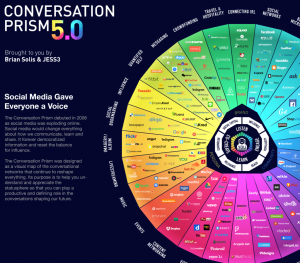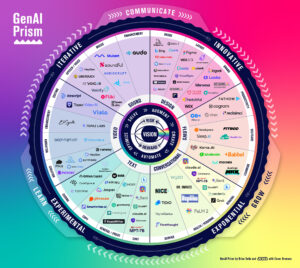
In social media, questions, and not answers, dominate the landscape for branded digital programs. Anyone who tells you otherwise, is misinformed. The answers that reveal strategy and direction are ours to discover, however it’s our responsibility to take the initiative to answer our own questions and accordingly, pave the roads for experimentation and experience. It is in these journeys where we learn everything and as such, become the experts we sought in our quest to seek direction and validation.
As brands vie for guidance and ultimately, credibility on social networks, they compete with the individuals who are also gaining prominence with every new connection they forge and reaction they cause. While social media is the great democratization of information, it is also the equalization of influence. As such, brands compete for attention and ultimately advocacy equally.

While years of branding may provide leverage in social media, the reality is as profound as it is rooted in common sense, in a landscape of equalized influence, everyone is racing towards prominence. Thus, in social networks such as Facebook, Twitter, Yelp, and Foursquare, we begin at the beginning.
I guess the point is this, the mere presence of a brand is lackluster and honestly, it’s the ante required to play this game. Many brands believe that simply creating these presences is all that’s required to “win.” But, consumers are far too sophisticated now and they’re not interested in your quests to build a stable of influential avatars. They are the gatekeepers that stand between your brand and your marketplaces as they’re represented online. In fact, many of the most influential voices within social networks, have mastered social networking beyond what you know or think you know.
The answer to “why” your brand is present is a good place to start. The creation of a new or renewed conviction to a mission statement reveals purpose and as such, unlocks the keys to earn presence and ultimately credibility. But as the old proverb says, “actions speak louder than words.” Indeed. And in social media, this is about turning our words into actions.
InSites Consulting conducted research in January 2010 and concluded that social networks reach an estimated 940 million people around the world. While that number may seem inconsequential to some brands, the truth is that social networks are gaining insurmountable significance and along with it, consumer attention and loyalty follow en masse.
For the naysayers within the organization and those who report to them, take note. Consumers place trust and value behind their peers or consumers with similar experiences – no surprise. According to InSites Consulting, their research indicates that in social networking, the brand itself follows in close second. In a distant third, hard to believe of course, are journalists.
Most credible sources of information about a brand in social networks according to worldwide Internet users, January 2010:

The study also found that thoughtful brands were also earning the attention of consumers ranking third behind bands and notable celebrities and personalities and ahead, quite surprisingly, of charities.
Groups that social network users worldwide fan, January 2010:

58% of participants in the study had already fanned pages and 79% were already active in social networks.
Attention and Intention
For those brands who engage with purpose and resolve, will find their actions merit rewards. It’s one thing to earn fans, it’s ultimately the goal of every business, to transform fans into customers and advocates.
Recently emarketer reported that Chadwick Martin Bailey and iModerate studied how brand graphs (the relationships that are interwoven within social networks) and the social graphs maintained at the consumer level impact the likelihood for purchases. The results were promising. More than 50% of Facebook fans and 67% of Twitter users reported that they are more likely to make a purchase for the brands they follow.
Equally important, the power of social and earned media indicates that 60% of respondents claimed their Facebook fandom increased the probability of providing recommendations to friends. In Twitter, the numbers were more pronounced. Nearly 80% stated that following a brand would result in a referral.
US Internet users who are more likely to buy/recommend a brand since becoming a fan/follower on Facebook, February 2010:

The report also sought to uncover why people follow brands in social networks. And for those brand managers seeking inspiration or data to make your case for pilot programs or upcoming campaigns, the top response may or may not come as expected. Most respondents, 255, claimed that they follow brands to receive discounts and promotions. Consumers on Twitter agreed, but also stated that real-time information and exclusive content were primary reasons.
For those decision makers who believe that the stature of the brand warrants respect and loyalty simply by creating a presence, only 2% of those surveyed stated that they follow brands on Twitter to show their support.
Primary reason that US Internet users are fans of a brand on Facebook, February 2010:

Chadwick Martin Bailey also asked fans about why they initially followed brands, allowing them to choose as many reasons as they deemed necessary. Notice the difference in the responses.
49% – Already a customer
42% – Show of support
40% – Discounts and promotions
34% – Fun and entertainment
On Twitter however..
51% – Existing customer
44% – discounts
42% – Fun
The prevailing insight for brands is quite simple, pay attention and create a content and engagement strategy that caters to the needs of all consumers. Social Media represents the socialization and personification of brands and social networks are the public forums where relationships are forged and tested. Brands earn the attention, trust, loyalty and advocacy they deserve and by delivering value across all of the fronts that determine the success and prominence of brands offline and online, businesses can earn the reward of community and commerce.
Connect with Brian Solis on Twitter, LinkedIn, Tumblr, Google Buzz, Facebook
—
Please consider reading my brand new book, Engage! – I’ll buy it back if you didn’t find it helpful.
—
Get Putting the Public Back in Public Relations and The Conversation Prism:


—
Image Credit: Shutterstock






“Every brand believes that simply creating these presences is all that’s required to “win.” ”
A bit of an overstatement, no? I agree that this is generally true, but examples of the “good” brand abound.
Social media is word of mouth. All the data you cite above is further evidence of this.
Duly noted…changed “every” to “many” – and that's just based on the companies that I've worked with and those I've interviewed over the years. Thanks Ian.
LOL, I hate to discourage hyperbole.
The underlying thesis of this post is brilliant- engage with customers genuinely and pro-actively on their 'turf' and you will succeed in the social media game. Thank you!
Great article. Mainly because it gives a new insight to the social media sites and their popularity nowadays. Everybody talks about the importance of social media for brands, the importance of achieving lots of fans and turn them into potential customers, and so on. But nobody really talks about the harsh competition for supremacy, that when achieved will end with the basis of what social media means: equal opportunities. Besides, the 65% (if not more) of the internet users are really bombarded with marketing, and in my opinion it tends to be too much, too agresive, maybe.
Makes sense Brian. We're soooooooooooooooooooooo (did I make that clear enough?) marketed to, mostly in ways we hate, every single day. When we do come across something that is different or in a way that we don't hate, we love to share really. A great example of this is just recently Toyota uploaded their videos for the Toyota Sienna on the Sienna Youtube page.
The videos were funny (especially the Swagger Wagon) and I shared it on Facebook and Twitter. Sure, I'm not their target audience but if it warranted that kind of response from me, chances are it'll warrant that response from others in their key demographic.
Hey Brian, thanks for the thorough and thought-provoking article. Couple things come to mind:
1) “create a content and engagement strategy that caters to the needs of all consumers.” ALL consumers?? That sounds like a Big Task to me. Or did you mean all types of consumers – ie. the ones that want discounts, the ones that want entertainment etc? If you could clarify, that would be great.
2) It seems that a lot of social media advice and strategy has revolved around creating community and all that warm-fuzzy stuff. However “to become part of a community of like-minded people” ranks extremely low on the chart of reasons why people become a brand's 'fan.' What do you make of that? Should companies forget about community as a strategy?
The notion that “actions speak louder than words” is the achilles heel of brand marketing in the social media. The credibility of word-of-mouth information is in the notion that a “real” person sharing their “real” thoughts about a brand relies upon the premise that their advocacy is the result of independent and unbiased judgment.
When marketers intrude in social networks, however well meaning, their attempts to directly influence the frequency and nature of what individuals have to say about their brand erodes the credibility of independent judgment – so in the end, I'm left to wonder if the short-term benefits we get from actively engaging consumers and the public are worth the long-term effects it may have on the value of social marketing.
It may be too soon to suggest that marketers are poisoning the well, but it's worth considering whether there will be a backlash.
Nice post, Brian. I especially liked the information on the primary reason that US Internet users are fans of a brand on Facebook. Very telling statistics. Thanks!
Thanks Michael…
It's so true! The primary reason for every business should be to engage and have customers turned evangelists. The graphs were very informative.
Brian:
Like the thinking and fundamentally agree, but, would suggest that a brand be thought of as a message, not a product or service. This has been an axiom for all of our client strategies and our most recent editorials.
Welcome your further commentary.
Thats fact basically between USA and UK market, here in UK brands are popular but non brands are also given importance and it can be seen when we measure our SM reports from the clients in eCommerce markets